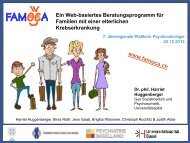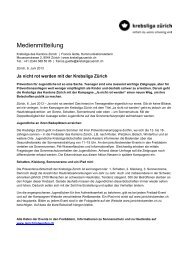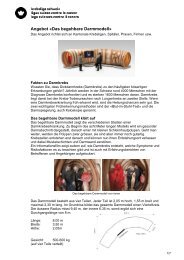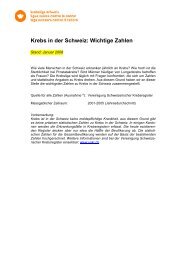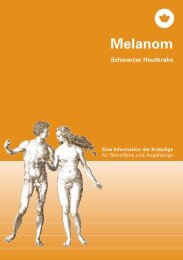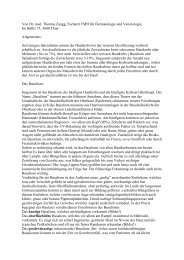Cancer Research in Switzerland - Krebsliga Schweiz
Cancer Research in Switzerland - Krebsliga Schweiz
Cancer Research in Switzerland - Krebsliga Schweiz
Create successful ePaper yourself
Turn your PDF publications into a flip-book with our unique Google optimized e-Paper software.
National <strong>Research</strong> Programme “End of Life” (NRP 67)<br />
The NRP 67 “End of life” aims to ga<strong>in</strong> new <strong>in</strong>sights <strong>in</strong>to the last phase of life. The knowledge<br />
useful to guid<strong>in</strong>g decisions and practices dur<strong>in</strong>g the last stage of life will be made<br />
available to decision-makers <strong>in</strong> the health care system, as well as to politicians and professionals<br />
<strong>in</strong>volved <strong>in</strong> the care of persons at the end of life. “Persons at the end of life”<br />
refers to persons – whether newborn <strong>in</strong>fants, children, young people, middle-aged, elderly<br />
or very elderly people – who <strong>in</strong> all likelihood will live no more than a few months.<br />
Perceptions and frameworks regard<strong>in</strong>g the end of life <strong>in</strong> a state of flux<br />
Perceptions and frameworks regard<strong>in</strong>g the end of life are currently <strong>in</strong> a state of flux. New<br />
<strong>in</strong>stitutions, such as palliative care services or suicide assistance organizations, dedicate<br />
themselves to the needs of persons reach<strong>in</strong>g the end of life. Demographic changes and<br />
new forms of family life challenge traditional models for support and provision of care<br />
to persons at the end of life. Liv<strong>in</strong>g wills, the practice of suicide assistance, diverse expectations<br />
towards medical care, and high health care costs, have become the subject of heated<br />
public debate.<br />
Most people <strong>in</strong> <strong>Switzerland</strong> currently die <strong>in</strong> old age. Medical decisions <strong>in</strong>fluence the dy<strong>in</strong>g<br />
process <strong>in</strong> many cases. The focus of these decisions is to ensure a “good dy<strong>in</strong>g”, and no<br />
(longer) to fight impend<strong>in</strong>g death. The discourse on “good” and “bad” dy<strong>in</strong>g has become<br />
<strong>in</strong>creas<strong>in</strong>gly pluralistic and <strong>in</strong>tense <strong>in</strong> recent years.<br />
Better understand<strong>in</strong>g of dy<strong>in</strong>g processes<br />
New research is needed to understand these developments better. This is the rationale<br />
for NRP 67, which <strong>in</strong>cludes four ma<strong>in</strong> research areas:<br />
– Dy<strong>in</strong>g processes and provision of care: The focus here is on the current state of care<br />
for persons at the end of life <strong>in</strong> <strong>Switzerland</strong>, on dy<strong>in</strong>g processes, and on attendant<br />
practices with a special focus on palliative care.<br />
– Decisions, motives and attitudes: This area centres on decisions made dur<strong>in</strong>g the dy<strong>in</strong>g<br />
process, and on the motives, convictions and attitudes underly<strong>in</strong>g them.<br />
– Regulations and proposals for action: The focus here is on normative rules such as legal<br />
regulation or ethics guidel<strong>in</strong>es, as well as questions regard<strong>in</strong>g distributive justice <strong>in</strong><br />
the health system.<br />
– Cultural concepts and social ideals: Death and dy<strong>in</strong>g have attracted a great deal of public<br />
<strong>in</strong>terest <strong>in</strong> recent years. This research area <strong>in</strong>cludes questions regard<strong>in</strong>g how death and<br />
dy<strong>in</strong>g are given mean<strong>in</strong>g, cultural representations of death and dy<strong>in</strong>g, and relevant social<br />
normalization processes.<br />
In February the Federal Council commissioned the Swiss National Science Foundation to<br />
carry out NRP 67 “End of life”. This research programme is endowed with a budget of<br />
CHF 15 million. The research projects will be selected after a two-stage procedure <strong>in</strong> 2011.<br />
The research projects will start <strong>in</strong> spr<strong>in</strong>g 2012 and will be completed <strong>in</strong> 2017.<br />
NRP 67 “End of life”<br />
Dr. Stephanie Schönholzer<br />
Swiss National Science Foundation<br />
Wildha<strong>in</strong>weg 3<br />
3001 Bern<br />
Phone +41 (0)31 308 22 22<br />
Fax +41 (0)31 305 29 70<br />
sschoenholzer@snf.ch<br />
www.nfp67.ch<br />
177



